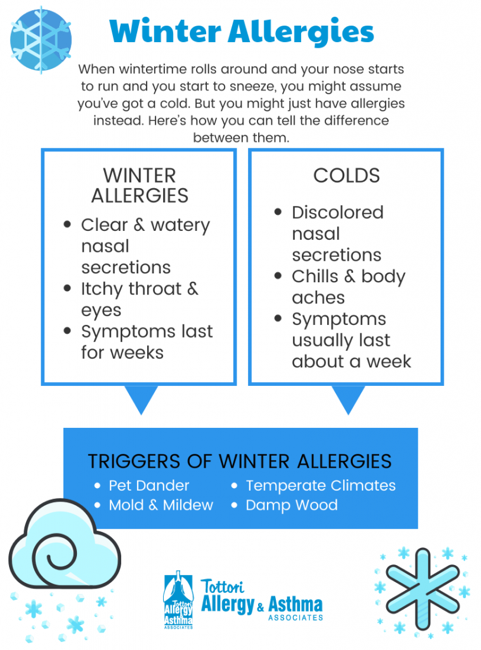Winter is Coming -- Allergies Too!
Get Ready for More Allergy Symptoms
By Ariel Stateman
With winter upon us in just a few short weeks, you may be thinking allergy season is finally over. While it is true that many people will experience less to no symptoms, it isn’t true for everyone. Winter allergies are a real thing. It really comes down to the individual and what you are sensitive to.
Yes, there are fewer outdoor allergens in the winter months, such as pollen floating around in the air but being stuck indoors has its own set of problems. Indoor heaters can stir up house dust, animal dander, and indoor molds. Another common indoor allergen are insect/mouse allergens. So, if you are sensitive to these allergens, you are more likely to notice and be affected by them in the winter when you are spending the majority of your time inside.
Some common winter allergy symptoms are sneezing; running nose; coughing; wheezing; nasal stuffiness; difficulty breathing; tightness of chest; itchy mouth/throat; and itchy, watery eyes (Bass, 2018). It’s important to know the difference between winter allergies and having a cold. See the blue boxes which highlight the main differences. You should try to keep a clean home to help decrease symptoms of indoor winter allergies. Vacuum and dust inside at least once a week in order to keep allergens from settling. Wash your bedding every week in hot water. Throw away old shower curtains that have mold. Use a dehumidifier to keep humidity in your home below 50% in order to help control mold and dust mites. And for all you animal lovers, don’t let your cats or dogs sleep in your bedroom, and try giving them a bath weekly. If symptoms are bothersome, you can try medications such as antihistamines, eye drops, decongestant sprays, nasal steroid sprays, allergy shots, or under-the-tongue tablets. Best of luck this winter!
Sources:
Bass, P. (2018, October 9). Can You Still Have Allergies and Asthma During the Winter? Retrieved from https://www.verywellhealth.com/winter-allergic-asthma-challenges-200559
Orenstein, B. W. (2012, December 21). Your Month-by-Month Guide to Allergies. Retrieved from https://www.everydayhealth.com/allergy-pictures/your-month-by-month-guide-to-allergies.aspx#13
https://www.nationaljewish.org/conditions/allergy/overview/lifestyle/winter-tips
Author: Ariel Stateman
About the author: Ariel Stateman is former a Research Assistant and mentee of the RIPLRT.

